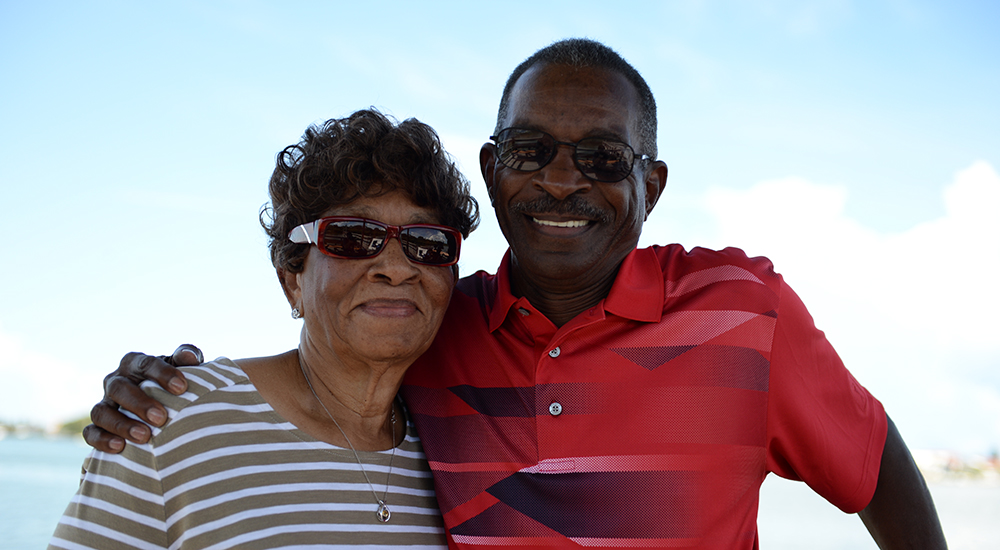Pierre Williams was a young Marine whose job as a “tunnel rat” was to ferret out any North Vietnamese soldiers. There were poisonous snakes and danger around every corner.
He came home to bad dreams and post-traumatic stress. With the help of Cognitive Behavior Therapy and Prolonged Exposure Therapy at the Bay Pines VA Healthcare System, Williams is learning to get past the pain.
Williams suffered from nightmares, intrusive thoughts and flashbacks for years before reaching out for help in 2009 and learning he had post-traumatic stress. Williams is pictured above with friend Josephine Smith of Saint Petersburg, Fla.
“The mental health team…gave me the tools to succeed.”
“The staff here at Bay Pines were very patient with me. They allowed me to express myself, were supportive when I needed them, and allowed me to talk about things that held me captive in my own way,” Williams said.
The therapy meant revisiting his past and all the dangers in Vietnam.
“I remember being in a tunnel and seeing matted baskets,” he said. “If you did not know how to navigate around them, or gave them the slightest bump, you could be bitten by the most poisonous kind of snake.
“One bite and you were dead.”
It took several more years before Williams tried additional therapy.
Dr. Kellie Hyde, a clinical psychologist for the Post Traumatic Stress Disorder Integrated Recovery Program, worked to gain his trust, make him feel safe, and assist him with taking the next step in his recovery.
“Prolonged Exposure Therapy can be very difficult for Veterans because it may feel very scary for them,” Hyde said. “When they do make the decision to have this type of therapy, their symptoms may worsen before getting better.”
Hyde helps Veterans understand why the therapy is important, how it is going to help them meet their treatment goals and, if they do the work, move past their trauma.
Helped me overcome my nightmares
“I was afraid to commit … because I knew it would bring out the most severe trauma events I endured in Vietnam,” Williams said. “However, one of the most significant steps in my recovery was when Doctor Hyde helped me to overcome one of the reoccurring nightmares I had.”
Dr. Sarah Barron, program manager for the Post Traumatic Stress Disorder Integrated Recovery Program, said this type of therapy is well researched and helps reduce symptoms so Veterans can have a more functional life. “Clinical experience tells us these are the most effective approaches in treating patients with PTSD,” Barron said.
Prolonged Exposure Therapy was not easy for Williams, but he said he is grateful to give it a chance.
“The turning point for me was when I realized the sincerity and compassion of the Mental Health team. They saw that I really wanted to do well in this program and gave me the tools to succeed,” Williams said.
Making treatment a collaborative process is important so Veterans reach their recovery goals. “The decision to engage in trauma-focused work can be a difficult one for many patients,” Hyde said. “Establishing trust and a relationship with them is imperative in helping to coach them along the process. I’m not the one driving the bus. They’re in charge.”
And now that Williams has completed the program, he encourages others to give it a chance. “This program has taught me to cope with my issues,” he said. “I would encourage others to come to VA and face their fears. You can’t face them by yourself. It takes a hero to ask for help and I am grateful that I did.”
For more information about National PTSD services available to Veterans click here: https://www.ptsd.va.gov/

Topics in this story
More Stories
Seven U.S. Army soldiers, one Army Reserve soldier and two Veterans are representing Team USA at the 2024 Olympic Games in Paris, which begins today.
Study underscores important role COVID vaccination can have in protecting Veterans from infection and reducing long-term health consequences
Columbia VA’s robotic surgery teams completed their 800th robotic surgery and are on schedule to hit 1,000 by the end of the year.







Only recently did I learn the term “tunnel rat”… Some times, most times, combat veterans are very selective of what they talk about. I learned this from my Dad, USMC during WWII, South Pacific and Guam. I learned it more intensely from my husband, Army, 25th Infantry, Vietnam, Tet. I was still in high school in 1968 and my parents did all they could to keep “reality” from myself and sisters to allow us to be kids. I knew there was war. I knew it was bad. I knew when I met my husband he had issues related to his Vietnam experience but I saw a kind, caring, and giving man under the trauma ridden soul I met. We were married 19 years when an article in a local paper told of a support group for spouses of vets with PTSD. I called and spoke with a lady from that group and made my first visit that very week. It was the first step saving our marriage and our lives. For 19 years I’d asked, begged, my husband to find help before his nightmares, acting out and “abusive” behavior got to be too much for me. I remember standing in the living room pointing to the door screaming, “There’s the door. Get help or get the f***k out.” He took me seriously, finally, and through my attending the spousal support group learned how to navigate the VA to get him the help he needed while getting the support I needed… Just knowing I was not alone was both helpful and saddening. My husband got mental health care, support group, and friendship that brought back the man I saw hidden away. Yes, it’s still tough. Yes, there are still scary and uncomfortable memories. But with the help we both got, we’ve managed to navigate the worse and have more “better” days than not.
I cannot thank the VA staff and veterans who have been so sincere in their caring that have brought us through some of the darkest of times. And I’m happy to say we are in our 25th year of marriage, closer to 26.
Mr. Williams, don’t give up! You are loved. And THANK YOU and WELCOME HOME.
I’m a former AF medic of the Vietnam Conflict and have over 40 years clinical experience in BHC. I utilize these same strategies in working w/ combat vets of all conflicts inc. Korea. I refer to this intervention as revisiting, reliving, and revising. This technique is also well revealed in a movie called “Instinct” starring Cuba Gooding JR. as the clinician and Anthony Hopkins as the client. In one scene the therapist implores the client “to take me with you” to the site of the trauma; and the client naturally queries him “can you follow?”. we need to assure every vet that we will remain w/ them every step of the way!
Thank you for this article,
Rich, MSW